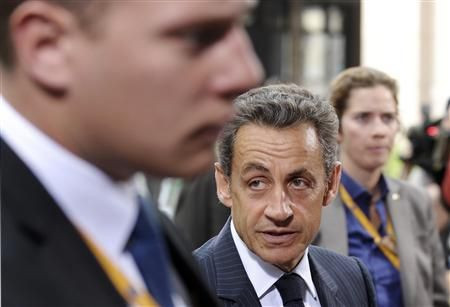France Weakest Link in the Euro's AAA Chain

French President Nicolas Sarkozy's key role in calming the euro zone crisis helps to take some of the heat off his own country's simmering debt troubles in the run-up to a presidential election.
But with French finances the weakest among the six AAA-rated euro zone countries, the conservative leader is still under pressure to ensure that France is not ejected from this elite club as he struggles for reelection in April 2012.
Last Thursday's deal on a second Greek bailout, which Sarkozy was particularly keen to secure, gives France more breathing room just as financial markets were beginning to take a second look at its poor public finances.
Before the summit, the premium Paris pays investors to hold its debt rather than fiscally correct German bonds more than doubled in a matter of weeks, showing investors doubting that France was as safe a financial haven as the other AAA euro countries -- Austria, Finland, Germany, Luxembourg and the Netherlands.
"We're on the edge, we're the worst among the AAA countries. France needs to make a big effort to stay among the AAA countries," said Philippe Delienne, president of Convictions Asset Management, which has 1.2 billion euros ($1.7 billion) of assets under management.
The three major ratings agencies have all reaffirmed France's AAA ratings over the past eight months.
But Alessandro Giansanti, a senior interest rate strategist at Dutch bank ING, said they were going too easy on France because it is an important player in the euro zone.
"There is some complacency on France because if you look at the fundamentals, especially deficits, it should be downgraded," he said.
ING calculates that France's finances and economy are more consistent with an AA rated country such as Belgium, although Giansanti puts France ahead of the United States, which the bank reckons now merits only an A rating.
If France lost its AAA rating, it could unravel all attempts to calm the euro zone crisis because it is the bloc's triple A countries that underwrite the European Financial Stability Fund at the heart of the rescue effort.
Standard and Poor's said last month that it would probably cut France's AAA rating in the long term if the government did not push through further reforms.
S&P said that if France is to hold onto its AAA rating until the middle of the century, it needed to balance its budget in the next five years, something that successive French governments on the right and left have not achieved since 1974.
ODD MAN OUT IN AAA CLUB
France has the highest deficit, debt and primary deficit -- the deficit before taking interest payments into account -- among the AAA-rated euro zone countries.
The government expects public debt to hit 86.9 percent of gross domestic product in 2012 before it starts declining, which the independent national audit office has described as approaching the danger zone.
France's contribution to the new Greece rescue package could push the debt ratio still higher, Prime Minister Francois Fillon said on Friday.
In a sign of declining international competitiveness, France is the only triple A-rated European country that runs a current account deficit, which hit a monthly record in May.
Overall government spending has remained over the last 20 years well above the average for countries in the Organization for Economic Co-operation and Development. The OECD estimates that total French government spending will equal 55.3 percent of GDP this year, second only to Denmark with 58.1 percent.
"When you look at France in terms of the wider triple A universe it definitely stands out as having one of the weakest public finance metrics," Fitch's primary France analyst Maria Malas-Mroueh told Reuters.
Determined to remain AAA, France's government aims to cut its budget deficit from an estimated 5.7 percent of gross domestic product this year to 4.6 percent in 2012 before meeting an EU-imposed target of 3.0 percent in 2013.
While France is on track to meet this year's target, many private economists and the European Commission, which polices EU members' public finances, expect Paris to overshoot next year's objective.
HOLIER THAN THOU
France's new finance minister, Francois Baroin, told Le Figaro magazine earlier this month that the 2012 budget would have to find more revenues, notably by cutting various tax breaks by more than the 3 billion euros currently foreseen.
"Thanks to reforms and budget control that we are pursuing with determination, France like Germany has investors' confidence in our sovereign bonds, which are considered to be among the safest," Baroin said.
The deficit is shaping up to be a major theme in the two-round presidential election in April and May 2012, with Sarkozy and Socialist contenders all trying to cultivate an image as the only safe choice.
The Socialists are likely to shoot down a bill the government wants to put to a special two-chamber vote that would write a German-style budget-balancing rule into the constitution.
Eager to avoid being seen as soft, both main candidates to run for the Socialists, Francois Hollande and Martine Aubry, said at the weekend they would respect the current government's pledge to cut the deficit to the EU ceiling in 2013.
However, the Socialists have also vowed to pick apart a pension reform Sarkozy pushed through last year in the face of weeks of protests and which rating agencies have said helped support France's AAA rating.
"Whether the left comes to power next year or Sarkozy remains, there will be some belt-tightening after the elections to make up for what wasn't done before the election," said Thierry Million, head of fixed income at Allianz GI Investments Europe, which has 123 billion euros under management.
"Our politicians are now well aware of the risks they take if they let the public finances get out of control. The crisis is the proof," he added.
© Copyright Thomson Reuters {{Year}}. All rights reserved.





















